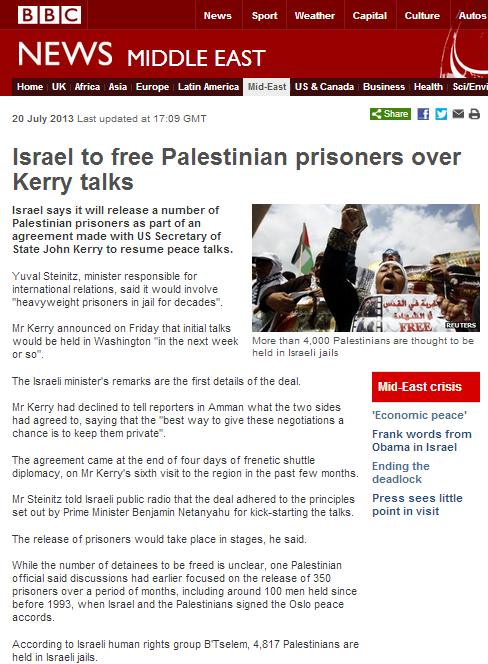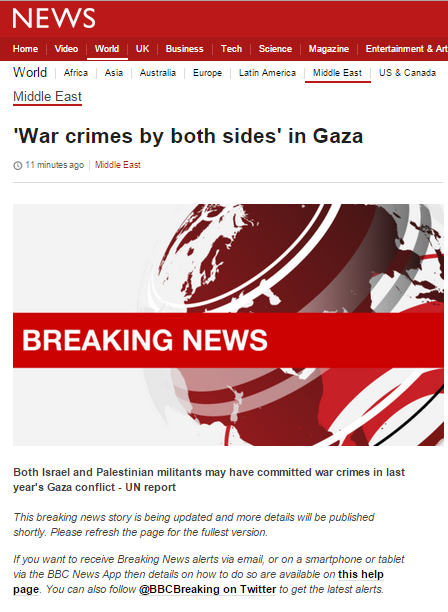On July 20th 2013 an article entitled “Israel to free Palestinian prisoners over Kerry talks” appeared on the Middle East page of the BBC News website.
As can be seen here, later versions of the article were garnished with the now standard BBC slogans concerning the previous round of talks and the legal status of ‘settlements’.
“Israel and the Palestinians last held direct talks in 2010, which were halted over the issue of settlement-building.”
As has unfortunately had to be stated here many times before, that pro forma insertion does not fully and accurately inform BBC audiences as to the real background to the discontinuation of talks nearly three years ago.
“The Palestinian Authority refused to continue direct negotiations in late September 2010 – two years and eight months ago. The statement fails to inform readers that prior to that break-down in talks, a ten-month freeze on construction had been implemented by Israel in order to encourage the renewal of discussions, but the Palestinian Authority failed to come to the negotiating table for nine of those ten months and then used the end of the construction freeze on September 26th 2010 as a pretext to refuse to continue talks.”
The BBC article continues with the standard statement:
“Settlements are considered illegal under international law, although Israel disputes this.”
Yet again, the BBC refrains from making the slightest attempt made to inform readers of the wider aspects of the issue beyond that trite slogan or to present alternative views on the subject or even to inform BBC audiences of the fact that there are opposing views to it which come from non-Israelis.
There is also nothing novel about this article’s euphemistic treatment of the subject of the Palestinian prisoners allegedly scheduled for release under the terms of the Kerry-brokered deal. The language used by the BBC conceals from its audiences the nature of the crimes for which those prisoners were convicted, with the word ‘terrorist’ not being used at all.
“Israel says it will release a number of Palestinian prisoners as part of an agreement made with US Secretary of State John Kerry to resume peace talks.
Yuval Steinitz, minister responsible for international relations, said it would involve “heavyweight prisoners in jail for decades”. […]
The release of prisoners would take place in stages, he said.
While the number of detainees to be freed is unclear, one Palestinian official said discussions had earlier focused on the release of 350 prisoners over a period of months, including around 100 men held since before 1993, when Israel and the Palestinians signed the Oslo peace accords.
According to Israeli human rights group B’Tselem, 4,817 Palestinians are held in Israeli jails.” [emphasis added]
According to Ha’aretz ($):
“Israel is planning to free some 82 of the 103 Palestinians sentenced to prison terms in Israel before the Oslo Accords were first signed in 1993, as part of the gestures to the Palestinian Authority in the context of the renewal of peace talks. The prisoners will not all be released immediately but rather in four different stages during the talks.
All the prisoners to be released have already served between 20-35 years in prison, most being Fatah members.” [emphasis added]
As readers no doubt remember, last month BBC Watch published a translation of the list of those pre-Oslo prisoners , their crimes and their sentences, which allows us to take note of the type of information about them which is not being reported by the BBC.
Among those on the list described as Fatah members we find, for example, Maher Younis and Kareem Younis – both of whom were convicted of the murder of Avraham (Avi) Bromberg (along with other crimes) and whose sentences are due to be fully served in 2023. Twenty year-old Corporal Bromberg was on his way home to Zichron Ya’akov from his base in the Golan Heights where he was a tank mechanic, when the cell which included Maher Younis and Kareem Younis kidnapped him, shot him in the head and stole his gun, leaving him mortally wounded. Avi managed to crawl to the side of the road, where he was found the next morning. He died several days later.
Also scheduled for release in 2023 is Bashir Al-Khatib – a member of Fatah’s ‘Force 17’ – who murdered Chaim Hai Hartouk in order to allow Fatah to make use of the victim’s body for the purpose of a prisoner exchange deal. Fatah members Ahmed Abu Jaber and Nofal Alifu Musbach Shakir kidnapped and strangled to death 21 year-old soldier Akiva Shaltiel in 1985. 
Other Fatah members on the list include Turkeman Yusef Suleiman Mahmed who, together with three accomplices also on the list, shot and killed Moshe Biton as he got out of his car at a convenience store and also shot and injured his wife Mali as she tried to help her husband. Al Haaj Othman Amar Mustafa and Damara Ibrahim Mustafa Bilal are imprisoned for the murder of Steven Fredrick Rosenfeld in 1989 whilst he was hiking near Ariel. In 1991 Abu Dahila Hassan Atik Sharif stabbed to death his employer Avi Osher – a father of two from Moshav Beka’ot – in a date palm grove.
The list goes on and on, but of course if BBC audiences are not informed of the acts of terrorism perpetrated by those the BBC insists upon euphemistically describing as “detainees”, they will not be able to comprehend the full meaning of any release of prisoners which may take place and their ability “to participate in the global debate on significant international issues” – as promised among the BBC’s public purposes – will be diminished.





